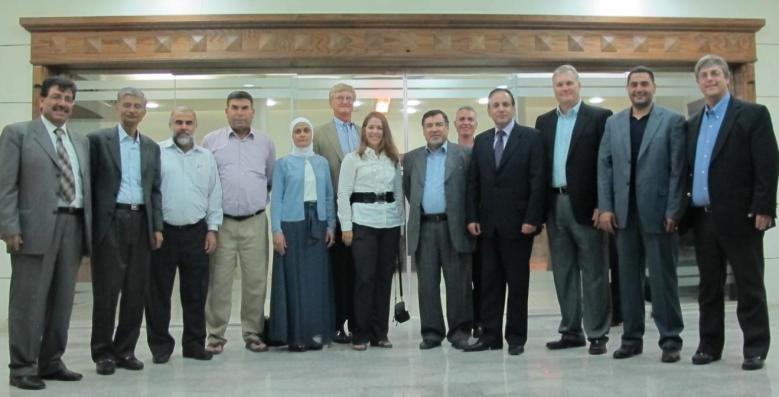
Arizona Utility Guides Jordan on Integrating Renewable Energy Into Jordanian Power System
WASHINGTON, D.C. – To advance Jordan’s ambitious goal of connecting up to 1,800 MW of renewable energy power plants by 2020 to their transmission system, senior engineers and support services executives from Jordan’s National Electric Power Company (NEPCO) received guidance from their counterparts at Arizona Public Service (APS). These meetings occurred from October 2-6, 2011 as a part of U.S.-Jordan Electric Power Transmission Partnership Program, an ongoing project supported by the U.S. Agency for International Development (USAID) Jordan Mission.
A delegation of three APS executives engaged in meetings, presentations, roundtable discussions and technical site visits in Amman and surrounding areas to share information on integrating renewable power resources and improving the efficiency and effectiveness of utility support services. This 4-year long partnership targets improvements to NEPCO’s commercial viability by providing technical support in transmission planning, operations and maintenance; and by sharing best practices on utility management, governance and human resources.
EXECUTIVE EXCHANGE HIGHLIGHTS
During this weeklong program, NEPCO and APS met to discuss technical and non-technical issues of strategic importance to Jordan’s transmission company: integrating intermittent renewable power resources into Jordan’s grid; power system stability and power control; developing technical training programs; and transforming NEPCO’s Human Resources department to meet 21st century utility needs.
BACKGROUND ON JORDAN’S POWER & ELECTRICITY TRANSMISSION SECTOR
Since 1980, Jordan’s electricity demand growth has averaged 9.1% annually due to the country’s high economic growth rates and commensurate increasing power needs. At the same time, their dependence on energy imports has increased significantly, amounting to roughly 13% of GDP in 2010. NEPCO is responsible for procuring Jordan’s electricity from independent power producers while simultaneously limiting Jordan’s exposure to fluctuations in energy resource prices and availabilities. Additionally, Jordan’s Ministry of Energy and Mineral Resources has undertaken an aggressive plan to incorporate up to 1,800 MW of renewable energy generation resources by the year 2020. This target is comprised of 600-1,200 MW wind power, 300-600 MW solar power and 30-50 MW waste-to-energy power generation, and will require an ambitious build-out of Jordan’s high voltage transmission grid.
THE CHALLENGES OF INTEGRATING RENEWABLE POWER RESOURCES
Like their Jordanian counterparts, APS is currently planning for significant additions of renewable power resources in the coming decade. During two days of presentations, APS shared their experience on setting interconnection requirements to be met by power producers and conducting detailed integration studies that model how intermittent power flows impact transmission system operation. They performed a thorough walk-through of APS’s system and power flow modeling process, including a detailed case study of a large wind farm interconnection. APS also reviewed their practices for protecting system reliability and power quality, outlining cost-effective contingency options like special protection schemes that ensure grid stability even during emergencies.
NEPCO’S ELECTRIC TRAINING CENTER – A REGIONAL RESOURCE FOR POWER SYSTEMS TRAINING
Located in Zerqa next to Jordan’s first central power station, NEPCO’s Electric Training Center (ETC) has graduated over 1,300 trainees from across the Arab world in technical fields dealing with electric transmission, distribution, power plant operations and electricity consumer services. NEPCO has ambitions to scale up the ETC to serve as a regional training hub for engineers and technical professionals in the electricity trades. During their visit, APS toured the ETC and offered administrators information on their training programs and training documentation practices. APS shared their methodology for training program design, as well as their philosophy for improving programs by seeking trainee feedback. They also provided information on APS’s apprentice program – an aggressive 4-year long program that is used to train and certify technical workers in a variety of operations and maintenance fields.
IMPROVING OPERATIONAL EFFICIENCY IN NEPCO’S SUPPORT SERVICES DEPARTMENTS
NEPCO has identified its Human Resources (HR) department as a critical player in executing the company’s forthcoming strategic plan. To provide the tools for facilitating and managing necessary structural and cultural changes at NEPCO, APS conducted a one-day workshop on change management and process improvement with NEPCO’s HR department. Discussions revolved around principles of “lean,” or efficient, operations and the elimination of wasteful practices from current procedures. In preparation for the workshop, NEPCO’s HR staff developed workflow charts documenting the exact steps of 10 critical HR department processes. APS challenged NEPCO to think about specific measures that would eliminate workflow bottlenecks, including implementation of software for grading entry-level job applicant exams and coordinating between HR department sections working on different pieces of the hiring process.
RESULTS
The APS Executive Exchange Visit gave NEPCO staff the opportunity to interact with 3 APS experts to discuss matters pertaining to integrating utility-scale renewables into the grid, process improvement and technical training design.
Additional specific outcomes of the exchange are as follows:
- Integrating Utility-Scale Renewables: NEPCO delegates learned about APS’s experience with integrating utility-scale renewable power plants into the transmission grid and the challenges of enhancing grid stability while interconnected to significant intermittent generation resources. NEPCO delegates received a thorough walk-through of APS’s system and power flow modeling process, including a detailed case study of a large wind farm interconnection. NEPCO engineers asked many questions about the placement of voltage control equipment on the transmission system in anticipation of the investments that they will need to make in order to accommodate utility-scale wind and solar plants on their system.
- Special Protection Schemes and Power Quality: NEPCO delegates learned about how interconnecting intermittent renewable power resources impacts power flows and grid stability, as well as techniques and equipment that they should consider purchasing in order to reinforce grid stability. NEPCO acknowledged the importance of having accurate real-time information on grid stability, including information about voltage at the point of interconnection with generators and the distribution system. APS stressed the importance of having precise data on the frequency rating of their own system in order to determine whether or not they can decrease their vulnerability to power swings from their neighbors, as well as to isolate themselves from events on their own system.
- Technical Training Requirements: NEPCO and APS delegates shared technical training course requirements for both utilities. NEPCO delegates learned about APS’s training procedures, which are based upon industry best practices, including training documentation and program evaluation. NEPCO received examples of training documentation, including lists of required courses for line workers, job performance evaluations, worker qualification requirements and training program descriptions.
- Process Improvement to Improve Productivity: NEPCO delegates learned of APS’s experience with enhancing the operational efficiency of support services during a workshop on process improvement. NEPCO received copies of the books, “Lean for Dummies,” and, “Creating a Lean Culture,” to use as additional resources on improving workplace efficiency. NEPCO delegates received process mapping templates to help them identify redundant or unnecessary steps in their procedures. With these templates, they created 10 process maps detailing the steps in key HR functions and learned to identify areas for improvement. NEPCO and APS delegates discussed the difficulties associated with reforming corporate culture, but recognized the importance of maximizing human and financial resources in order to optimize operational efficiency and achieve commercial success.
PARTICIPATING ORGANIZATIONS
- National Electric Power Company of Jordan (NEPCO)
- Arizona Public Service (APS)
- Electricity Distribution Company of Jordan (EDCO)
- Irbid District Electricity Company (IDECO)
- Jordan Electric Power Company (JEPCO)
- Ministry of Energy and Mineral Resources (MEMR)
APS PARTICIPANTS
- Baj Agrawal, Engineering Manager, Arizona Public Service (APS)
- Tom Glock, Director – Center for Process Excellence, Arizona Public Service (APS)
- Steve Quinn, Training Manager, Arizona Public Service (APS)
For additional information, please contact USEA’s Lauren Dickerson at [email protected] or +1-202-312-1238.
